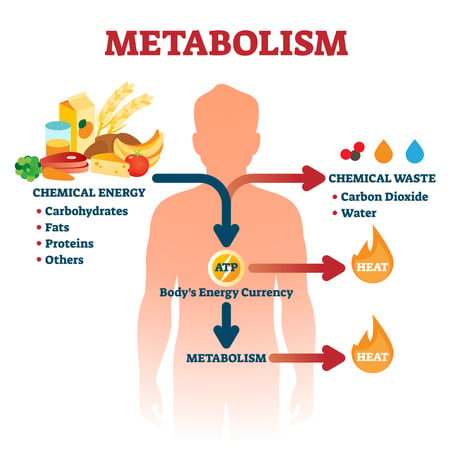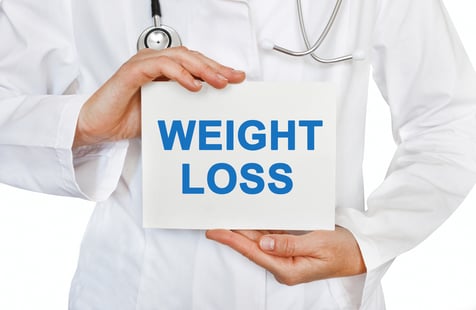Do Heavier People Lose Weight Faster?
By: Sharon Lehman, RDN
When it comes to weight loss efforts, you may be wondering how quickly you’ll see results. Everyone wants to lose weight fast, but not everyone experiences results at the same pace.
Perhaps you’ve wondered how two people following the same diet and exercise plan at the exact same time can lose different amounts of weight.
For example, men tend to lose weight faster than women and heavier people can lose more weight in a given timeframe compared to those who weigh less.
While diet and exercise play a big part in weight loss, they’re not the only contributing factors. The rate of weight loss is unique to each individual and determined by several factors.
In this article we will discuss:
- How weight loss works
- Details about calorie deficits and low carbohydrate diets
- Why heavier people lose weight faster
- Other factors that may speed up or slow down weight loss
- How to figure out your optimal rate of weight loss
Let’s start by revisiting how weight loss occurs and take a look at the things that impact the rate of weight loss.
How Does Weight Loss Work?
As you first begin to make changes to diet and exercise during a weight loss program, weight tends to come off more rapidly. Those initial pounds lost often aren’t true fat loss, but rather lost water weight.
This is especially true for individuals who choose to follow a low-carbohydrate or ketogenic diet to lose weight.
The body’s carbohydrate stores, called glycogen, hold onto water. As glycogen stores are depleted and not replenished by carbohydrate intake, your body holds less water which looks like pounds dropped when you weigh-in.
Most people want to decrease fat mass on a weight loss program. When we refer to weight loss, we’re talking about fat loss. You lose weight when your body burns more calories through metabolism and physical activity than you take in through food and drinks. This is called a calorie deficit. The bigger the calorie deficit, the more weight you’ll lose in a given time frame.
You have to burn approximately 3500 calories to lose one pound of fat. Creating a calorie deficit of 500 calories per day will result in about 1 pound lost per week. A smaller deficit than that will result in slower weight loss, while a greater deficit will result in more than 1 pound lost per week.
There’s some wiggle room with calorie intake. Overall, as long as the number of calories you’re eating each day averages to a deficit over each week, you’ll lose weight. You can also create a calorie deficit by increasing the number of calories you burn through exercise. Whether your starting weight is lighter or heavier, your rate of weight loss primarily depends on the calorie deficit you create.
That being said, heavier people do tend to lose weight faster. Here’s why.

Why Do Heavier People Lose Weight Faster?
The number of calories your body burns at rest and during exercise, aka your metabolism, increases with body weight.
A person who weighs 250 pounds naturally burns more calories than someone who weighs 150 pounds. That means heavier people have greater daily calorie needs than lighter people.
Let’s say the 250-pound person needs 2500 calories each day and the 150-pound person needs 1800 calories each day to maintain their current weight.
The heavier person can create a bigger calorie deficit than the lighter person. The 300-pound person could reduce calorie intake to 1500 calories per day, resulting in a calorie deficit of 1000 calories a day or about 2 pounds lost per week.
If the 150-pound person wants to lose 2 pounds per week, they would have to eat 800 calories a day which isn’t realistic.
A daily intake below 1200-1500 calories is too low to meet most people’s energy and nutrient needs.
Don’t forget that exercise also contributes to a calorie deficit. Heavier people burn more energy during exercise because they have more weight to move.
If the 250-pound person is eating below their calorie needs and exercising, they’ll lose weight even faster due to a bigger calorie deficit.

How to Lose Weight Faster
There are a few other factors that can impact the rate you lose weight, including gender, genetics, sleep, and current diet and exercise habits.1
Men lose weight faster because they naturally have higher metabolisms due to a higher muscle to fat ratio than women.
Research has found individuals who don’t get enough sleep and/or miss out on high-quality sleep lose less weight than those who sleep better.2
If you’re used to eating healthy meals and getting regular exercise, you may not lose weight as fast as someone who has more diet and exercise changes to make.
For example, someone who drinks several sugar-sweetened sodas per day can often lose weight just by eliminating the soda, which creates a calorie deficit and making no other changes.

What is a Safe Rate of Weight Loss?
For safe and sustainable weight loss, slow and steady wins the race.
In general, losing 0.5 to 3 pounds per week is considered a safe rate of weight loss.
It may be tempting to create a more drastic calorie deficit by decreasing the amount you eat or increasing the amount you exercise to lose weight faster, but doing so is not healthy or sustainable.
Eating too little can make you feel poorly, result in moodiness, headaches, dizziness, and/or fatigue, and potentially increase your risk of nutrient deficiencies.
Losing too much weight too quickly often results in regaining the lost weight as soon as calorie intake increases to a more normal level.
When you lose weight too fast, you may not be losing weight where you want to be. Losing more than a couple of pounds per week likely isn’t entirely fat loss. Accelerated weight loss could cause a decrease in both fat mass and lean muscle.3

Summary
It can be frustrating to see others lose a greater amount of weight faster than you. It’s easy to feel overwhelmed if you're months away from meeting your weight loss goal.
The important thing to focus on during weight loss is your unique journey. Celebrate each pound lost and all the non-scale victories you accomplish as you work toward your goal.
At the end of the day, it doesn't matter how long it takes you to meet your goal. What matters most is that you’re creating habits to better your health for the long term.
References
1. Ashtary-Larky D, Ghanavati M, Lamuchi-Deli N, et al. Rapid Weight Loss vs. Slow Weight Loss: Which is More Effective on Body Composition and Metabolic Risk Factors? Int J Endocrinol Metab. 2017;15(3):e13249.
2. Nedeltcheva AV, Kilkus JM, Imperial J, Schoeller DA, Penev PD. Insufficient sleep undermines dietary efforts to reduce adiposity. Ann Intern Med. 2010;153(7):435-441.
3. Finkler E, Heymsfield SB, St-Onge M-P. Rate of weight loss can be predicted by patient characteristics and intervention strategies. J Acad Nutr Diet. 2012;112(1):75-80.





